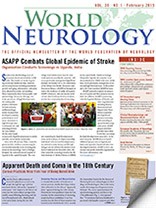By Raad Shakir
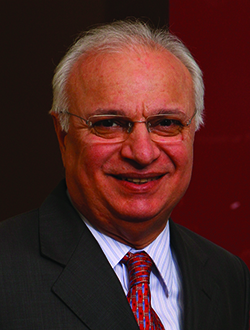
Raad Shakir
The year has passed so quickly, we have to evaluate our activities as well as plan our future. In 2014 the WFN faced many challenges and has come through some difficult times with renewed vigor in placing neurology in a better position.
The six WFN regions have been even more active in evaluation and planning, especially in the year of the Chile Congress. The biennial congresses are now making the WFN much more focused on its members and regions. We meet our colleagues more regularly and have the most productive discussions.
Last year started well. Regional directors and trustees met in London and ideas as well as practical activities were planned and started. All committees were formed and given their remit to start work. In years between Congresses, meetings of committees are usually held in regional or major neurological congresses for members to attend and contribute.
The creation of the regional liaison committee chaired by Prof. Tim Pedley, chair of the WFN North American region, is another step in devolving WFN activities to the six regional directors. Closer integration and direct collaboration will lead to more fruitful and quicker results. The RLC will conduct its activities and report to the WFN trustees. Perhaps the major regional development in neurology is the amalgamation of the European Federation of Neurological Societies and the European Neurological Society. This momentous occasion happened in the joint meeting in Istanbul, and the first meeting of the newly formed European Academy of Neurology will take place June 20-23, 2015, in Berlin.
Three of our regional organizations are undergoing major change and restructuring. The Pan American Federation of Neurological Societies has produced its constitution and bylaws. This regional organization will finalize its legal and financial arrangements in 2015. It will represent the South American region in the WFN.
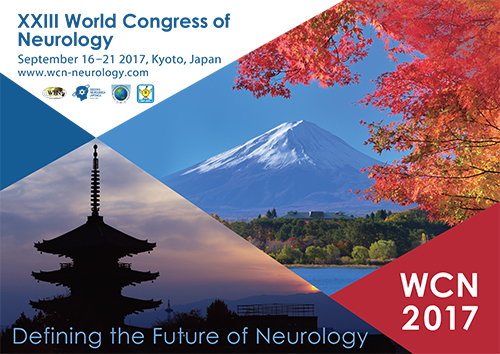
Figure 2. The logo for Kyoto 2017.
The Pan African Association of Neurological Societies (PAANS) is undergoing major reconfiguration. The association has been in existence since 1972. It is a joint neurology and neurosurgery association. The African neurosurgeons have decided to form their own association under the auspices of our sister organization, WFNS, and therefore the African neurology colleagues are in the process of re-writing their bylaws. The tentative name of “The African Academy of Neurology” has been chosen for the new organization. Work is moving ahead to bring this about in 2015.
The Asian and Oceanian Association of Neurology is now well established and has a legally registered status in Singapore. It held its last congress in Macau in March 2014. The next AOCN will be held July 14-16, 2016, in Kuala Lumpur, Malaysia.
The Pan Arab Union of Neurosciences Societies held its biennial meeting in Jeddah, Saudi Arabia, Jan. 22-24, 2015. The plan was to consolidate the regional organization with the establishment of a permanent secretariat and fiscal arrangements.
Regional associations are the most knowledgeable bodies in their areas and they will guide all activities of the WFN in combination with specialty organizations as well as applied research groups. In this way the WFN will have the best advice on all its activities from those with first-hand knowledge.
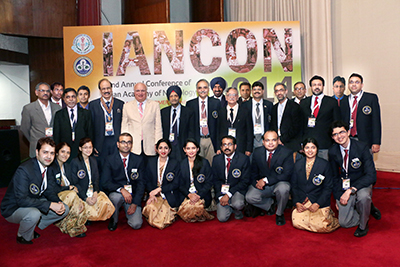
Figure 3. A group of attendees at the Indian Academy of Neurology Conference November 2014 in Chandigarh.
In 2014 there were major changes to the way the WFN works. In support of our main objective of promoting quality neurology, the WFN grants are moving on at a pace. The recipients for the 2014 tranche have received their funds and the projects are progressing. We now have a well-developed follow-up system of auditing and reporting. The idea of twinning recipients from two or three countries is proving to be successful in adding expertise and promoting collaboration. Fig. 1 shows the list of the grants for 2014.
During 2014, the negotiations with Elsevier continued and culminated in two separate contracts. The first is the renewal of the contract for publishing our journal (Journal of the Neurological Sciences). The terms took a long time to agree upon, and the WFN publications committee under the chairmanship of Prof. Christopher Kennard (UK) was instrumental in our efforts. The contract is for another 10 years with many provisions to safeguard the interests of the WFN. The second contract is to establish a new online electronic journal under the name of eNeurologicalSci. Prof. Bruce Ovbiagele from South Carolina, U.S., is the editor-in-chief of this journal. The two editors Prof. John England and Prof.Ovbiagele will work together guiding authors so that the chance of their work being published is increased. In essence, 2015 will see consolidation of the WFN involvement in two journals. We urge all WFN member societies to encourage their members to support and publish in the WFN-sponsored journal.
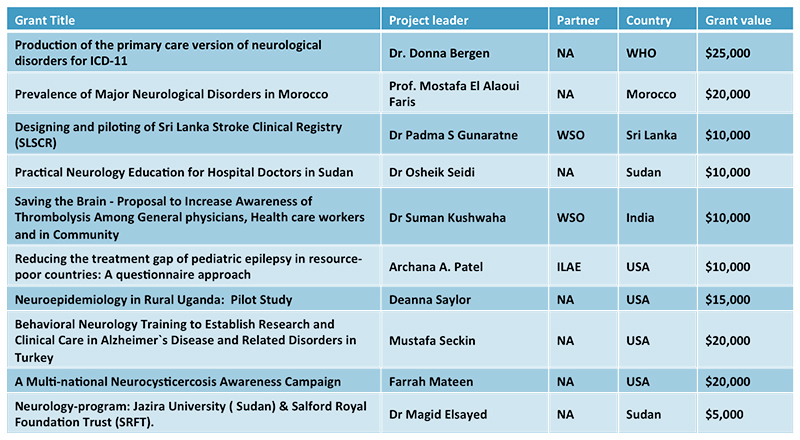 The WFN administration was consolidated in 2014 with additions of new staff and continued support for all our committees. The central office in London is coordinating the change, which is supported by staff located outside the UK. The relationship with Kenes as providing some office management activities is continuing. Kenes is now the WFN PCO for the Santiago Congress and the 2017 Kyoto congress as well (Fig. 2). The preparations for both are advancing well. The scientific and teaching courses for Santiago are now complete. Our Chilean colleagues are working hard to finalize the details during the next 10 months. With biennial WCN congresses the work on congresses is constant. It is very important to note that expertise learned from one is easily transferred to the next congress. The WFN congress committee under the chairmanship of First Vice President William Carroll has the responsibility of coordinating all congress matters. The council of delegates in Santiago will choose the city for the 2019 WCN. The WFN is delighted to have two fantastic venues in contention: Cape Town, South Africa, and Dubai in the UAE. We wish the two societies the best in their endeavors to present the best case to the Council.
The WFN administration was consolidated in 2014 with additions of new staff and continued support for all our committees. The central office in London is coordinating the change, which is supported by staff located outside the UK. The relationship with Kenes as providing some office management activities is continuing. Kenes is now the WFN PCO for the Santiago Congress and the 2017 Kyoto congress as well (Fig. 2). The preparations for both are advancing well. The scientific and teaching courses for Santiago are now complete. Our Chilean colleagues are working hard to finalize the details during the next 10 months. With biennial WCN congresses the work on congresses is constant. It is very important to note that expertise learned from one is easily transferred to the next congress. The WFN congress committee under the chairmanship of First Vice President William Carroll has the responsibility of coordinating all congress matters. The council of delegates in Santiago will choose the city for the 2019 WCN. The WFN is delighted to have two fantastic venues in contention: Cape Town, South Africa, and Dubai in the UAE. We wish the two societies the best in their endeavors to present the best case to the Council.
Following the decision of the Council of Delegates in 2014, a new position of WFN treasurer has been approved. The nominating committee under the chairmanship of Prof. Marianne de Visser (Netherlands) will receive nominations from member societies for this post and the vacated post of trustee. The nominating committee will publish the names of candidates six months prior to the WCN. Elections for both will be very important for the WFN management structure.
The close collaboration with the WHO is continuing in earnest. The two projects now are firstly, the second edition of the Neurology Atlas, which was first published in 2004, and the second is the work on ICD-11, which is coming to fruition in the next year or so.
All societies have been asked by the WHO to provide data on neurological services and practicing neurologists as well as training. The atlas is a unique and most valuable asset and the information is crucial for the advancement of neurology across the world. I urge all member societies to fill in the questionnaire supplied by the WHO so that we can have a meaningful atlas as soon as possible.
One of our major neurological societies held its annual congress in November.
The 22nd Annual Conference of Indian Academy of Neurology IANCON 2014 was held in the Postgraduate Institute of Medical Education and Research, Chandigarh, India, November, 6-, 2014 (Fig. 3). The conference was attended by 1,300 delegates in addition to 200 faculty members both from India and abroad. There were 340 oral presentations in addition to posters and e posters. I had the privilege to pair with Prof. Sarosh Katrak from Mumbai in conducting a grand round session with lively discussion from the floor. Rather fiendishly difficult cases were presented from across India. Prof. Vivek Lal, the chair of the organizing committee, was most active in making sure that all arrangements went smoothly. I was most impressed with the level of papers presented and most grateful to Prof. Chandrashikhar Meshram, President of the Indian Academy of Neurology, for the invitation.
A unique and novel phenomenon affecting neurology occurred in 2014. The Ice Bucket Challenge went viral and the money raised for amyotrophic lateral sclerosis passed $115 million. The probable reason is the use of social media and the fact that most individuals across the world participated within a very short time for this money-raising activity. Many of our families and friends were nominated and indeed participated. It only emphasizes the enormous power of social media in our daily lives.
I wish all neurologists and their families across the world a happy and healthy 2015.
